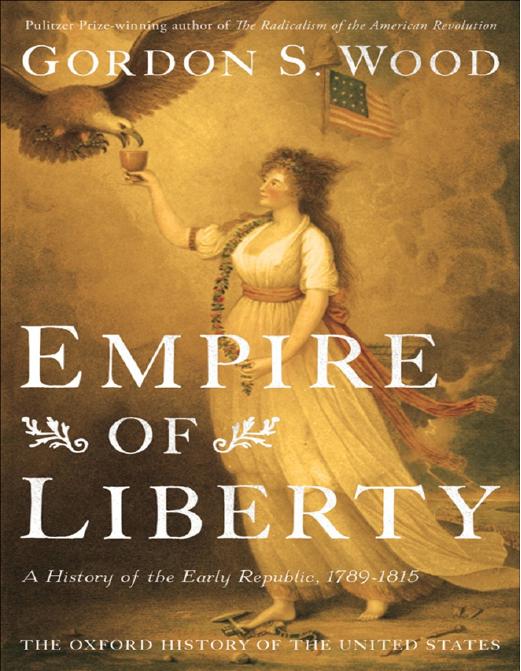Empire of Liberty: A History of the Early Republic, 1789-1815 by Gordon S. Wood

Author:Gordon S. Wood
Language: eng
Format: mobi, epub, pdf
Tags: #genre
ISBN: 9780195039146
Publisher: Oxford University Press
Published: 2009-01-02T05:00:00+00:00
13
Republican Reforms
Despite all the increased violence and rioting, despite all the anxiety over America’s climate, despite all the hand-wringing over so much licentiousness spreading everywhere, by the early nineteenth century most Americans continued to remain extraordinarily confident and optimistic about the future. They could readily respond to the overweening enthusiasm of poet and diplomat Joel Barlow in his Fourth of July oration of 1809. Public speakers on such memorable occasions, said Barlow, were called upon “to give utterance to the feelings of their fellow citizens,” and that he intended to do. America, he said, had passed its infancy and was now looking forward confidently to its adolescence and its manhood. Providence had assigned Americans a special destiny, a theme iterated over and over in these years. The country was not only new to its own people, “but new also to the world.” America required thoughts and principles different from those of the Old World. “There has been no nation either ancient or modern that could have presented human nature in the same character as ours does and will present it; because there has existed no nation whose government has resembled ours . . . a representative democracy on a large scale, with a fixed constitution.” The United States, said Barlow, was “the greatest political phenomenon, and probably will be considered as the greatest advancement in the science of government that all modern ages have produced.”
But, Barlow added, Americans could not rest on their future promise; they had to work to achieve it. “Nations are educated like individual infants. They are what they are taught to be.” Monarchies could exist with a corrupt and ignorant people, but republics could not. In order to sustain their republic, Americans had realized from the outset of the Revolution that they would have to throw off their older monarchical habits and thoughts and make themselves over. But they had every reason to believe that they were equipped to do so.1
They knew—their modern assumption lying at the heart of the Enlightenment told them so—that culture was something constructed, something made by people; and thus they could solve any problem by remaking what they thought and believed. If they could remake something in the physical world as intractable as the climate, then reforming something as man-made as their culture seemed much less challenging. Since free and republican America was “in a plastic state,” where “everything is new & yielding,” the country, said Benjamin Rush, “seems destined by heaven to exhibit to the world the perfection which the mind of man is capable of receiving from the combined operation of liberty, learning, and the gospel upon it.”2
At the heart of the Revolution lay the assumption that people were not born to be what they might become. By exploiting the epistemology of John Locke, Americans had concluded that a child’s mind was a blank slate, or, as one Quaker schoolmaster in 1793 called it, “soft wax.” And since “the mind of the child is like soft wax, which will
Download
Empire of Liberty: A History of the Early Republic, 1789-1815 by Gordon S. Wood.epub
Empire of Liberty: A History of the Early Republic, 1789-1815 by Gordon S. Wood.pdf
This site does not store any files on its server. We only index and link to content provided by other sites. Please contact the content providers to delete copyright contents if any and email us, we'll remove relevant links or contents immediately.
The Secret History by Donna Tartt(16643)
The Social Justice Warrior Handbook by Lisa De Pasquale(11492)
Thirteen Reasons Why by Jay Asher(7796)
This Is How You Lose Her by Junot Diaz(5790)
Weapons of Math Destruction by Cathy O'Neil(5045)
Zero to One by Peter Thiel(4832)
The Myth of the Strong Leader by Archie Brown(4795)
Promise Me, Dad by Joe Biden(4452)
Beartown by Fredrik Backman(4427)
Stone's Rules by Roger Stone(4420)
How Democracies Die by Steven Levitsky & Daniel Ziblatt(4407)
The Fire Next Time by James Baldwin(4348)
100 Deadly Skills by Clint Emerson(4084)
A Higher Loyalty: Truth, Lies, and Leadership by James Comey(4038)
Rise and Kill First by Ronen Bergman(4016)
The David Icke Guide to the Global Conspiracy (and how to end it) by David Icke(3889)
The Farm by Tom Rob Smith(3878)
Secrecy World by Jake Bernstein(3787)
The Doomsday Machine by Daniel Ellsberg(3736)
